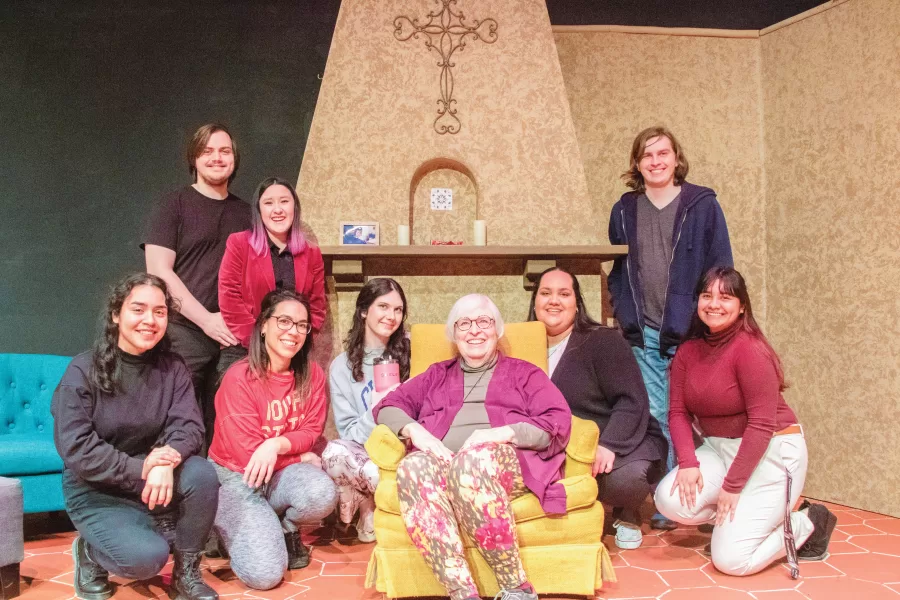‘Dream Hou$e’ navigates Latina identity
The cast of “Dream Hou$e” poses after the show at The Station Theater on Thursday.
February 6, 2023
“Dream Hou$e,” a critically acclaimed play about two estranged Latina sisters navigating grief, culture and identity while selling their ancestral home via a home-improvement reality TV show, opened on Thursday to a packed house at The Station Theatre in Urbana.
On the night of the show’s debut, patrons were shoulder to shoulder, chatting in anticipation of the play.
Madeline Seim is a long-time frequenter of the theater. She said she distinctly remembers the last production, “Homegrown,” which was about the Jan. 6 insurrection. She added that it was very funny.
“We come all the time.” Seim said. “They do a lot of topics. They do some musicals that … are staples, but then they do a lot of topics that are more socially oriented.”
Another audience member, Andrew Rehn, began volunteering as a set painter during the production of “Homegrown” and continues to actively participate at The Station Theatre.
Get The Daily Illini in your inbox!
Rehn said the idea for the set is based on Spanish Revival architecture indicative of the setting: California. He said he enjoys seeing how drastically the same materials turn into different sets.
As the lights dimmed, the black box theater created an intimate environment for the audience. Director Jacqueline Moreno found it perfect for this story for that reason.
Moreno, senior in FAA, said that she has been pursuing theater since high school. She added that she has a background in acting and dramaturgy but has enjoyed directing the most because it allowed her to have control of the story.
“I like how personal it can feel,” Moreno said. “I like getting really up and close and personal with the stories that I hope to tell.”
The set was a dark beige stucco living room with clay tiles painted onto the floor. There was a decorative cross, baby photos and various trophies on the altar.
The two sisters, Julia and Patricia Castillo—played by Laney Rodriguez and Mariana Seda, respectively—enter and are enraptured by unresolved conflicts, responsibilities and surreal games that they are required to participate in to sell their home.
The reality show they wish to sell their house on, “Flip It or List It!” is complete with a perky passive-aggressive host, Tessa Westbrook, played by Gabrielle Demarco, and game show sound effects.
As the play continues, they begin to navigate how gentrification is affecting the setting’s neighborhood of Hilo Villa, Calif.
Moreno said gentrification is largely affecting California and places closer to home like Chicago, adding that the Latinx neighborhood of Pilsen, Chicago, is being pushed out.
She said she hopes this story inspires the audience to try and engage in positive action to prevent this process.
“Hopefully, it makes the audience (ask) questions like, ‘Is this a problem I am seeing right now, and how can I personally try and help?’” Moreno said. “(It can be) something as small as ‘Hey, maybe I should buy coffee from this local Mom-and-Pop shop.’”
Moreno said she believes the play is also about self-identity, culture and sacrifice. They said the play first screamed at her through the character of Patricia Castillo.
“A lot of what she talks about (is) wanting to make great money and not wanting to work until her bones turn to dust like her mother,” Moreno explained. “I’ve had to watch my own mother work hours and hours on end. I don’t want to do that. I want to give my own parents luxury.”
Actress Laney Rodriguez, graduate student studying theater, has been acting for the last 17 years.
Rodriguez said the play is a story all audiences can resonate with due to its major themes of family, grief, loss, identity and assimilation.
“I think this play offers this unique opportunity to see something through a very specific lens, and it really resonates with so many different people,” Rodriguez said.
She said she appreciates the tight-knit community of artists at The Station Theatre and the opportunity to tell these stories.
“It gives actors of color (the chance) to portray those stories that are closer to home and share those stories that otherwise would not have been told,” Rodriguez said. “One of my goals as an actor (and) as an artist is to create this work that’s starting to change the narrative of the American theater as we know it. I think stories like this are really helping to make that come true.”







